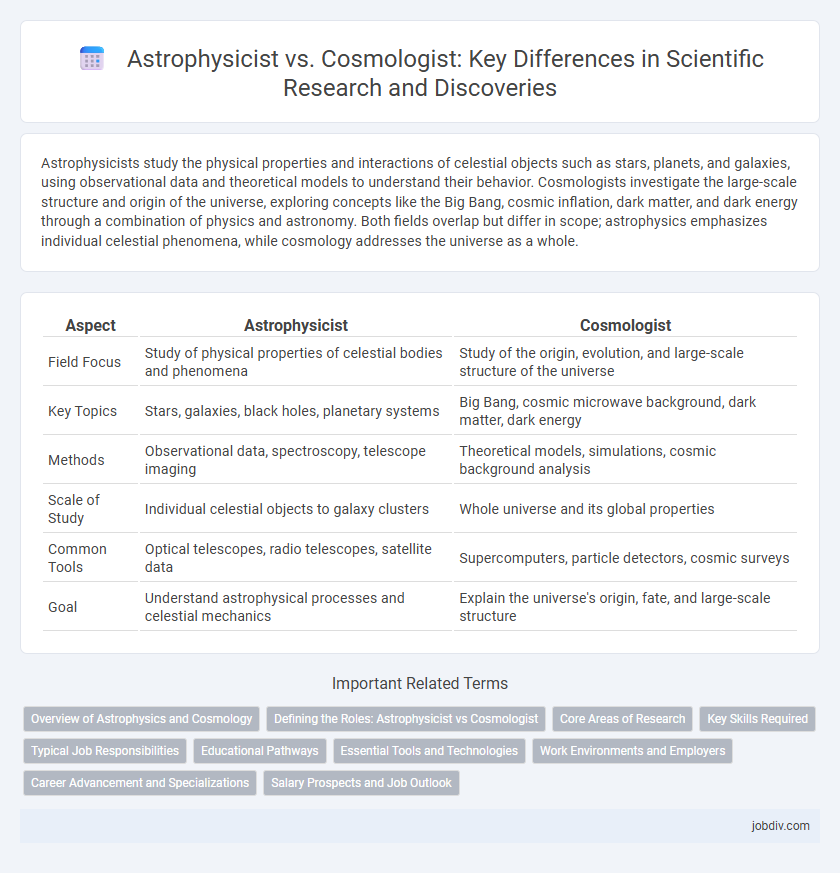Astrophysicists study the physical properties and interactions of celestial objects such as stars, planets, and galaxies, using observational data and theoretical models to understand their behavior. Cosmologists investigate the large-scale structure and origin of the universe, exploring concepts like the Big Bang, cosmic inflation, dark matter, and dark energy through a combination of physics and astronomy. Both fields overlap but differ in scope; astrophysics emphasizes individual celestial phenomena, while cosmology addresses the universe as a whole.
Table of Comparison
| Aspect | Astrophysicist | Cosmologist |
|---|---|---|
| Field Focus | Study of physical properties of celestial bodies and phenomena | Study of the origin, evolution, and large-scale structure of the universe |
| Key Topics | Stars, galaxies, black holes, planetary systems | Big Bang, cosmic microwave background, dark matter, dark energy |
| Methods | Observational data, spectroscopy, telescope imaging | Theoretical models, simulations, cosmic background analysis |
| Scale of Study | Individual celestial objects to galaxy clusters | Whole universe and its global properties |
| Common Tools | Optical telescopes, radio telescopes, satellite data | Supercomputers, particle detectors, cosmic surveys |
| Goal | Understand astrophysical processes and celestial mechanics | Explain the universe's origin, fate, and large-scale structure |
Overview of Astrophysics and Cosmology
Astrophysics explores the physical properties and behaviors of celestial bodies, analyzing stars, planets, galaxies, and black holes through observational and theoretical methods. Cosmology studies the origin, evolution, and large-scale structure of the universe, focusing on phenomena such as the Big Bang, cosmic microwave background radiation, and dark matter. Both fields use advanced technologies like telescopes and simulations to understand the fundamental forces shaping the cosmos.
Defining the Roles: Astrophysicist vs Cosmologist
Astrophysicists study the physical properties and behaviors of celestial objects such as stars, planets, and galaxies, applying principles of physics to understand phenomena like black holes, neutron stars, and cosmic radiation. Cosmologists focus on the large-scale structure and origin of the universe, investigating concepts like the Big Bang, cosmic inflation, dark matter, and dark energy to explain the universe's evolution and fate. Both fields overlap in studying space but differ in scope, with astrophysics emphasizing specific celestial bodies and cosmology addressing universal-scale questions.
Core Areas of Research
Astrophysicists primarily study the physical properties and behaviors of celestial objects such as stars, planets, and galaxies, focusing on phenomena like black holes, supernovae, and the interstellar medium. Cosmologists investigate the large-scale structure and evolution of the universe, including the Big Bang, dark matter, dark energy, and cosmic microwave background radiation. Both fields use advanced observational data and theoretical models, but astrophysics centers on individual cosmic entities, while cosmology addresses the universe's overall origin, structure, and fate.
Key Skills Required
Astrophysicists require strong analytical skills, proficiency in advanced physics, and experience with observational data and instrumentation to study celestial phenomena. Cosmologists demand expertise in theoretical physics, mathematics, and computer modeling to explore the universe's origin, structure, and evolution. Both fields rely heavily on programming skills, statistical analysis, and a deep understanding of physical laws to interpret complex data and develop scientific theories.
Typical Job Responsibilities
Astrophysicists primarily analyze the physical properties and behaviors of celestial bodies, such as stars, planets, and galaxies, using observational data and theoretical models. Cosmologists focus on understanding the large-scale structure and evolution of the universe, studying phenomena like the Big Bang, cosmic microwave background radiation, and dark matter. Both fields involve data analysis, mathematical modeling, and the use of advanced telescopes and simulations to interpret complex cosmic phenomena.
Educational Pathways
Astrophysicists typically pursue a bachelor's degree in physics or astronomy, followed by a Ph.D. specializing in astrophysics, emphasizing observational and theoretical aspects of celestial phenomena. Cosmologists often follow a similar academic track but focus their graduate research on the origin, evolution, and large-scale structure of the universe, integrating physics, mathematics, and philosophy. Both fields require strong foundations in advanced physics, computational methods, and data analysis to conduct research in their respective domains.
Essential Tools and Technologies
Astrophysicists primarily utilize telescopes, spectrometers, and particle detectors to study celestial phenomena and the physical properties of objects in space. Cosmologists employ advanced computational simulations, cosmic microwave background radiation measurements, and large-scale structure surveys to investigate the origin, evolution, and large-scale properties of the universe. Both disciplines rely heavily on high-performance computing and data analysis techniques for interpreting vast datasets collected from ground-based and space-based observatories.
Work Environments and Employers
Astrophysicists typically work in observatories, research institutions, and universities, analyzing celestial phenomena through data from telescopes and space missions. Cosmologists are often employed by academic institutions, government agencies, and research centers where they develop theoretical models to understand the large-scale structure and evolution of the universe. Both professions collaborate with organizations such as NASA, the European Space Agency, and national laboratories, but their work environments differ in emphasis on observational data versus theoretical frameworks.
Career Advancement and Specializations
Astrophysicists specialize in studying the physical properties and behaviors of celestial objects, leading to career advancement through roles in research institutions, observatories, and aerospace industries. Cosmologists focus on the origin, evolution, and large-scale structure of the universe, often advancing their careers by contributing to theoretical models and participating in space missions and academic research. Both fields require advanced degrees, with specializations in data analysis, computational modeling, and experimental techniques driving opportunities for leadership positions and interdisciplinary collaboration.
Salary Prospects and Job Outlook
Astrophysicists earn a median salary of approximately $115,000 annually, with job growth projected at 8% over the next decade, reflecting steady demand in research and academia. Cosmologists, often specialized astrophysicists focusing on the universe's origins, typically have similar salary ranges but encounter fewer direct job openings, making competition more intense. Both professions benefit from strong analytical and quantitative skills, though astrophysicists may find broader employment opportunities in government agencies and aerospace industries.
Astrophysicist vs Cosmologist Infographic

 jobdiv.com
jobdiv.com